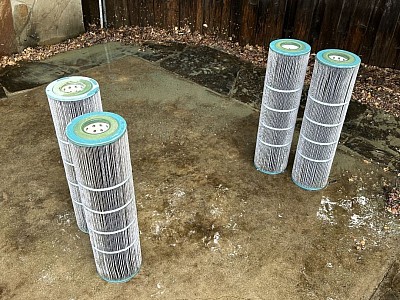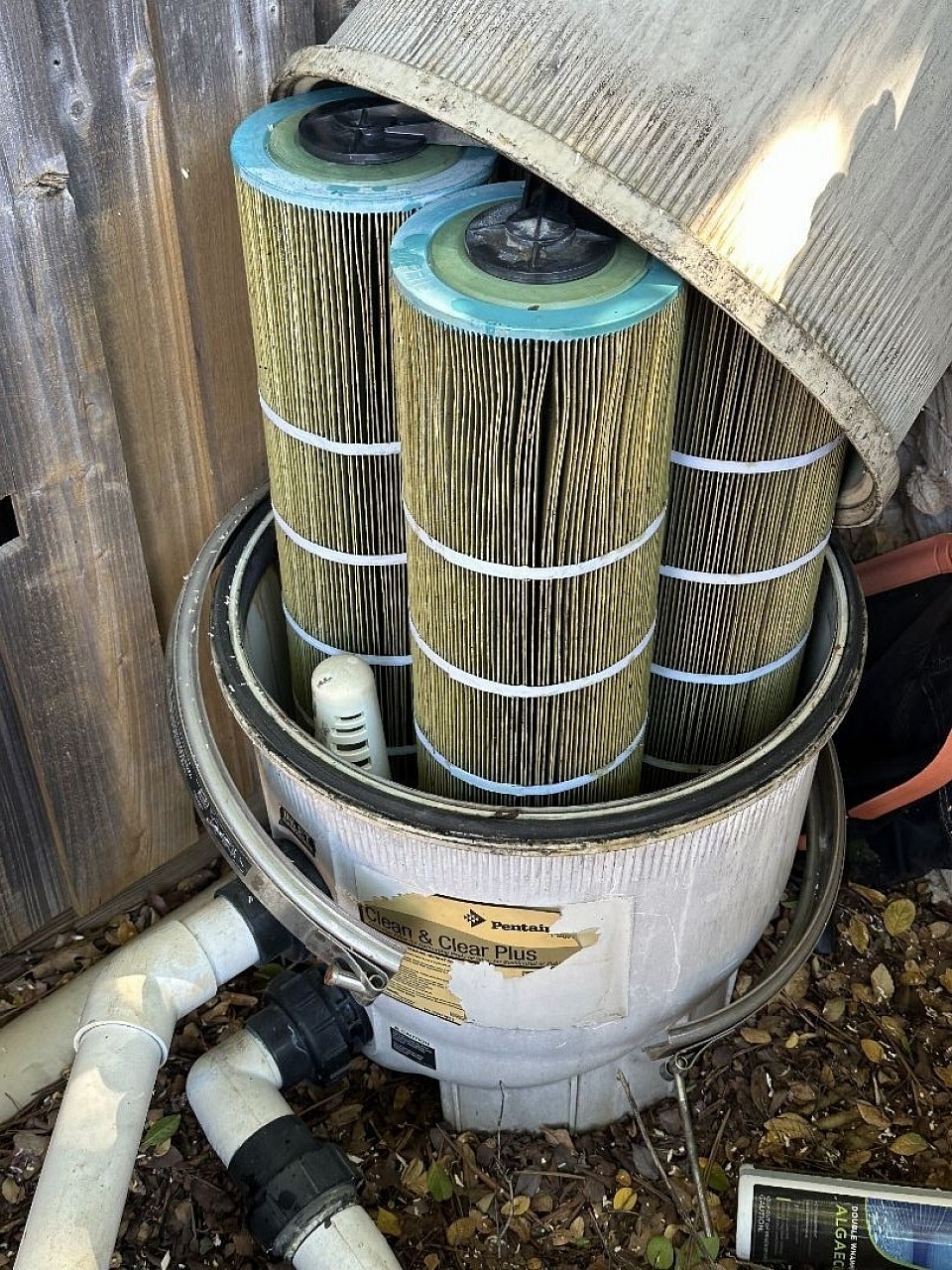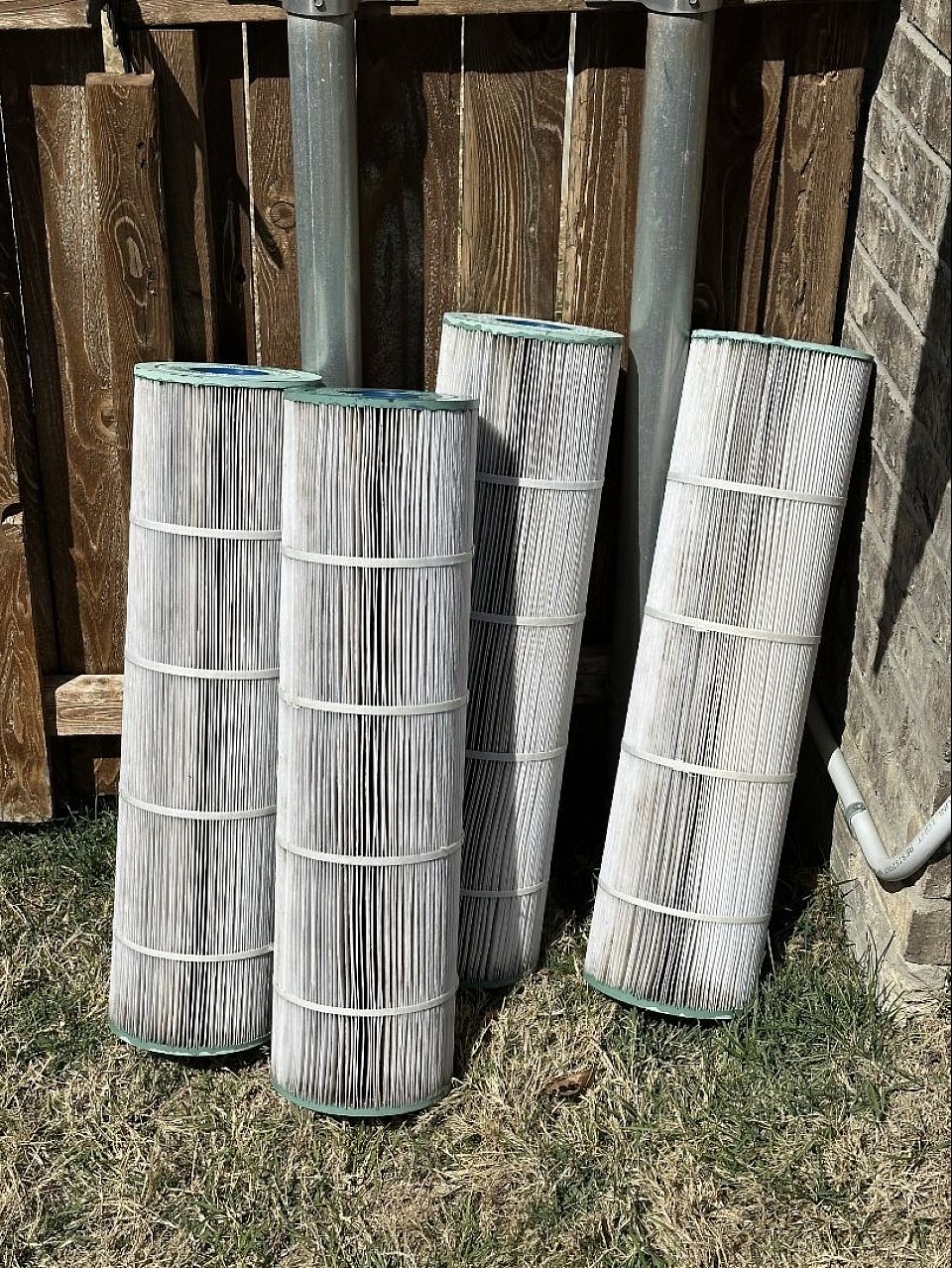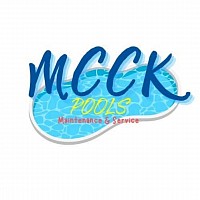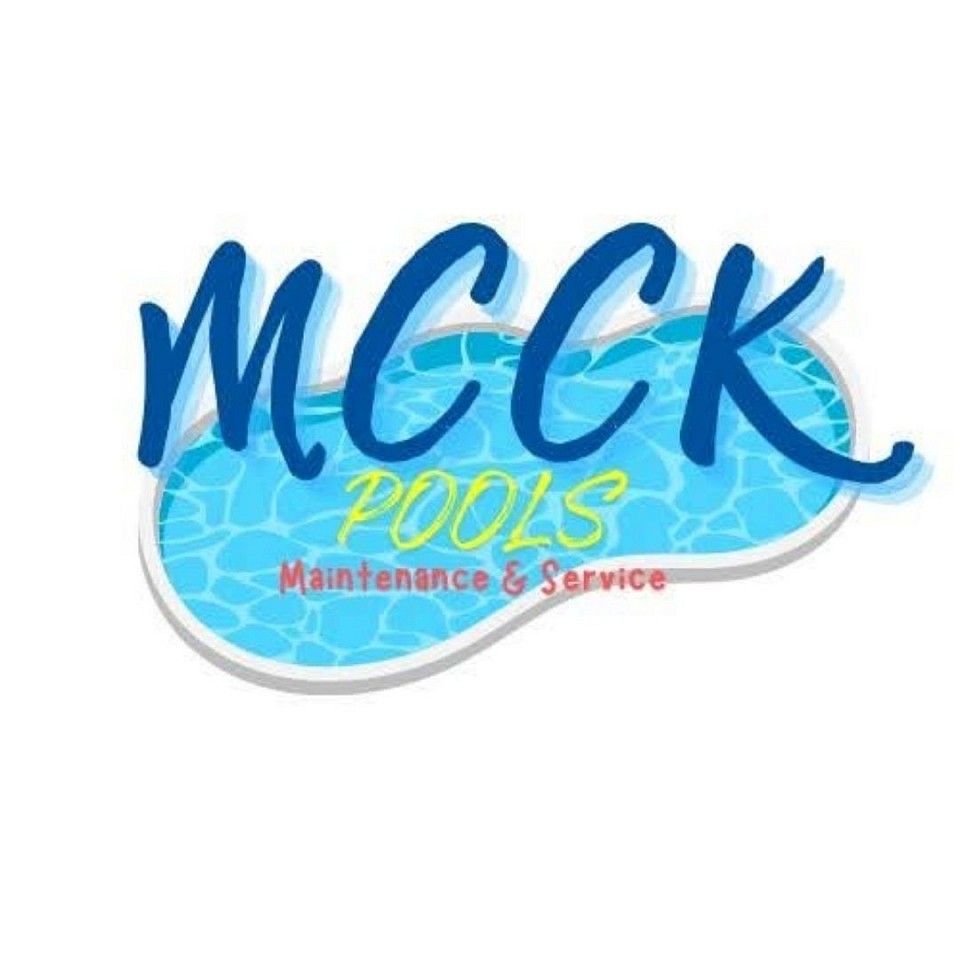MCCK Pools Blog
Pool Filter Cleaning: What It Is, Why It Matters, and When to Do It
Your pool filter is the unsung hero of your entire system. While the pump moves the water, it’s the filter that keeps it clean, clear, and safe to swim in.
What is a Filter Cleaning?
Pool filters trap dirt, oils, pollen, and fine debris from your water. Over time, these particles build up and clog the filter, reducing its effectiveness and putting strain on your pump. Cleaning the filter removes this buildup, helping your system run smoothly and efficiently.
Why is Filter Cleaning Important?
A dirty filter can’t do its job. It slows down water flow, makes your pump work harder, and can lead to cloudy water, algae, and higher energy bills. Regular filter cleaning keeps your water crystal clear and extends the life of your pool equipment.
When Should You Clean Your Pool Filter?
We recommend cleaning your filter at least every 3–6 months, depending on your usage and environment. Spring is a high time for filter maintenance—especially after pollen season, heavy rains, and backyard activity.
Today, we’re out cleaning three pool filters across town. It’s that time of year when your system works overtime, and we’re here to keep things running at full strength.
Need your filter cleaned?
Call Mike today at 817-773-1035 for a free estimate. MCCK Pools is licensed, insured, and ready to help you stay ahead of pool maintenance—before problems pop up.
Top Five Signs Your Pool Needs Professional Repair
Your pool should be a place of relaxation—not frustration. If you’re noticing issues, it might be time to call in the pros. Here are 5 common signs your pool needs professional repair, and how MCCK Pools can help:
1. Water Loss or Unexplained Leaks
If your pool is losing water faster than normal, it could be a leak. Leaks not only waste water but can also cause damage to your pool’s foundation if left untreated.
2. Strange Noises from Equipment
Unusual humming, grinding, or screeching noises coming from your pump or filter are a red flag. These sounds often signal failing components that need immediate attention.
3. Cloudy or Green Water
Even if you’re adding chemicals regularly, water that stays cloudy or turns green might indicate an issue with your filtration system—or a hidden maintenance problem.
4. Cracked Tiles or Pool Surfaces
Cracks in your tile, plaster, or decking can quickly go from cosmetic to structural. It’s best to have them inspected and repaired before they spread or worsen.
5. Weak Water Flow
If your jets aren’t as strong as they used to be, your circulation system may be struggling. Poor flow affects water quality and puts strain on your equipment.
Don’t wait until it’s too late.
If you notice any of these issues, call Mike today for a free repair estimate. MCCK Pools is licensed, insured, and ready to get your pool back to perfect.
The Ultimate Guide to Using a Pool Test Kit – MCCK Pools
Maintaining balanced pool water is essential for keeping your pool safe, clean, and sparkling.
One of the most effective tools for this is a pool test kit, which can help you measure the key chemical levels in your pool, such as pH, chlorine, alkalinity, and calcium hardness.
Why Use a Pool Test Kit?
Regularly testing your pool water helps you stay ahead of potential problems. Incorrect water chemistry can lead to cloudy water, skin irritation, and even damage to your pool equipment. By keeping an eye on these important chemical levels, you can ensure that your pool is always in prime condition for swimming.
Steps for Using Your Pool Test Kit
Collect a Water Sample
Always gather water from about 18 inches below the surface to get an accurate reading. Avoid surface water as it can be affected by debris and environmental factors.
Add Reagents
Pool test kits typically include test tubes and reagents. Add the required drops of the chemical reagents to the water sample in the test tube. Make sure to follow the instructions exactly, as adding too much or too little reagent can affect the results.
Compare Results
After the reagents mix with the water, the sample will change color. Compare the color of the water in the test tube with the provided color chart to determine the levels of chlorine, pH, and other chemicals in your pool.
Adjust Chemicals as Needed
Based on your test results, you may need to adjust the levels of chemicals like pH, alkalinity, or chlorine to bring them back to ideal levels. This ensures your pool remains clean and safe for swimmers.
When to Test Your Pool Water
It’s recommended to test your pool water at least once a week during the swimming season. During hotter weather, or if you have heavy pool use, you may want to test more often. Regular testing helps prevent problems from developing and saves you from expensive repairs in the future.
Common Pool Water Issues to Watch For
High pH Levels: Can cause skin and eye irritation and affect chlorine efficiency.
Low Chlorine Levels: Can lead to algae growth and poor sanitation.
High Alkalinity: Can cause cloudy water and affect pH stability.
By understanding how to use a pool test kit and regularly checking your pool water, you can avoid these issues and enjoy a clean, safe swimming environment.
If you’re looking for more help maintaining your pool or need expert assistance with water testing, feel free to contact Mike at (817) 773-1035.
Let MCCK Pools take care of your pool needs!
The Ultimate Pool Cleaning Schedule: Keep Your Pool Pristine All Year Long
By MCCK Pools | Call Mike at (817) 773-1035 for service or support
Owning a pool is one of life’s great luxuries—until it turns green, cloudy, or starts smelling funky. Whether you're a new pool owner or just want a smarter system to stay on top of maintenance, MCCK Pools has your back.
This easy-to-follow, app-style pool cleaning schedule will help keep your water sparkling, your equipment running smoothly, and your pool party-ready all year long.
Daily Pool Care (5–10 Minutes)
Every Morning
-Skim leaves, bugs, and floating debris
-Empty your skimmer and pump baskets
-Check the water level and pump sounds
These small steps prevent big problems later.
Weekly Pool Maintenance
Mondays – Test & Treat
-Test water: pH, chlorine, and alkalinity
-Add chlorine tablets or salt as needed
-Balance pH and alkalinity
-Shock the pool after heavy use or rain
Wednesdays – Brush & Inspect
-Brush pool walls, steps, and floor
-Look for early signs of algae or staining
-Make sure your pump is circulating well
Fridays – Vacuum & Flow
-Vacuum the pool (manual or automatic)
-Check filter pressure and backwash if needed
-Ensure your return jets are circulating water correctly
Sundays – Filter & Equipment Check
-Clean your filter or backwash
-Inspect the pump, heater, and seals
-Top off the water if needed
Monthly Deep Maintenance
-Every 1st of the Month
-Deep clean or replace filter cartridge
-Test calcium hardness and cyanuric acid (stabilizer)
-Lubricate seals and inspect valves
-Do a deep scrub if there's buildup
Seasonal Pool Opening (Spring)
-Remove, clean, and store the pool cover
-Reconnect equipment
-Fill pool to proper water level
-Balance water and shock
-Run pump 24–48 hours continuously
Seasonal Pool Closing (Fall)
-Vacuum and clean thoroughly
-Lower water level
-Add winter chemicals
-Blow out the lines and plug returns
-Cover the pool securely
Pro Tips from MCCK Pools
-Run your pump 8–12 hours/day in warm months
-Store chemicals safely in a dry, shaded area
-Keep water level halfway up the skimmer
Need Help? We’ve Got You Covered.
Pool maintenance doesn’t have to be a chore.
If you’d rather spend your time swimming than scrubbing, give Mike a call at (817) 773-1035. MCCK Pools offers expert cleaning, equipment maintenance, water balancing, and seasonal service—all at prices that won’t drain your wallet.
Swim smart. Stay sparkling. Call MCCK Pools today.
Why Spring is the Best Time to Service Your Pool
As the weather warms up and the days get longer, it’s time to start thinking about getting your pool ready for the season. At MCCK Pools, we believe that spring is the ideal time to service your pool—and here’s why.
1. Get Ahead of the Rush
Spring is when everyone starts thinking about pool parties, backyard barbecues, and lazy afternoons in the water. Booking your cleaning and maintenance early means you beat the summer rush and ensure your pool is ready before the season hits full swing.
2. Address Winter Wear and Tear
Cold temperatures and winter storms can take a toll on your pool equipment and surfaces. Spring servicing helps spot and fix issues like cracked tiles, equipment malfunctions, or leaks—before they become big problems.
3. Ensure Safe and Balanced Water
The changing temperatures in spring can throw off your water chemistry. We’ll test and balance your pool water to make sure it’s safe, clear, and ready to swim in, right from the first warm day.
4. Save Money in the Long Run
Early maintenance can help detect and prevent costly repairs. Taking care of your pool in spring protects your investment and keeps your equipment working efficiently all season.

